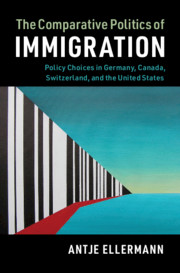 The Comparative Politics of Immigration
The Comparative Politics of Immigration Book contents
- The Comparative Politics of Immigration
- Cambridge Studies in Comparative Politics
- The Comparative Politics of Immigration
- Copyright page
- Dedication
- Contents
- Figures
- Tables
- Acknowledgments
- 1 Introduction
- 2 Theorizing Immigration Policy
- 3 The Making of Swiss Immigration Policy
- 4 The Making of German Immigration Policy
- 5 The Making of Canadian Immigration Policy
- 6 The Making of US Immigration Policy
- 7 Conclusion
- References
- Index
- Series page
2 - Theorizing Immigration Policy
Veto Points and the Insulation Logics of Policy Arenas
Published online by Cambridge University Press: 27 February 2021
- The Comparative Politics of Immigration
- Cambridge Studies in Comparative Politics
- The Comparative Politics of Immigration
- Copyright page
- Dedication
- Contents
- Figures
- Tables
- Acknowledgments
- 1 Introduction
- 2 Theorizing Immigration Policy
- 3 The Making of Swiss Immigration Policy
- 4 The Making of German Immigration Policy
- 5 The Making of Canadian Immigration Policy
- 6 The Making of US Immigration Policy
- 7 Conclusion
- References
- Index
- Series page
Summary
This chapter presents the book’s policy arenas framework which seeks to account for the direction and magnitude of immigration reform. Whether policy reform will liberalize or restrict immigration will depend on policy makers’ insulation from four actors with distinct sets of preferences: domestically, the general public and interest groups; internationally, immigrant sending states and immigrant receiving states. Whereas insulation from popular pressure and from diplomatic pressure by receiving states will allow for policy liberalization, insulation from interest groups and sending states will move policy in the direction of immigration restriction. Which of these pressures policy makers are exposed to will vary across policy arenas. The chapter then turns its attention to the policy path itself, distinguishing between constitutional rules and political strategy. Constitutional rules define the arenas through which a policy proposal must minimally pass. Oftentimes informed by policy learning, political strategy can account for variation in policy paths over time in a given constitutional context. The chapter then theorizes the magnitude of policy change by distinguishing between incremental and paradigmatic immigration reform. The success of paradigmatic immigration reform will depend upon a highly restrictive set of conditions, most importantly, the absence of reform opponents with veto power.
Keywords
- Type
- Chapter
- Information
- The Comparative Politics of ImmigrationPolicy Choices in Germany, Canada, Switzerland, and the United States, pp. 50 - 83Publisher: Cambridge University PressPrint publication year: 2021
